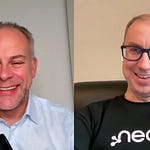In today’s episode of our CVC series, Andreas and our CVC in-house expert, Jeppe Høier, sit down with Nicolas Sauvage, President of TDK Ventures, the corporate venture capital arm of TDK Corporation, a global leader in electronics and materials technology. With $350 million in AUM across three funds, TDK Ventures focuses on hard tech, deep tech, and energy transformation. It invests between $250K and $10 million per deal while balancing strategic alignment with venture-scale returns.
Since founding TDK Ventures in 2019, Nicolas has built one of the market's most disciplined and entrepreneur-friendly CVCs, backing startups in sustainability, mobility, and advanced materials. Under his leadership, the firm has pioneered a unique "Diverse Advocate" investment process, ensuring rigorous due diligence and a first-principles approach to deep tech investing. In this conversation, Nicolas shares how TDK Ventures bridges the gap between startups and a global corporate parent, the power of patience in CVC, and why he believes nuclear fusion will be the defining energy source of the future.
Watch it here or add it to your episodes on Apple or Spotify 🎧 chapters for easy navigation available on the Spotify/Apple episode.
✍️ Show notes
1. TDK Ventures’ Investment Strategy
At the heart of TDK Ventures’ investment philosophy is its CODE framework:
C – Contribution to Society: Ensuring investments align with TDK’s broader mission of creating positive global impact.
O – One Team Reaching for the Sky: Encouraging curiosity, collaboration, and continuous learning across the team and ecosystem.
D – Delivering Deep Insights: Making data-driven, first-principles decisions, even when they seem contrarian.
E – Entrepreneurs First: Treating founders as customers, providing value beyond capital, and measuring NPS scores to track impact.
Nicolas emphasizes that CVCs must strike a balance between patience and urgency—patient in nurturing long-term strategic bets, yet urgent in executing when the right opportunity arises. TDK Ventures stands apart by investing not where TDK is today, but where it should be in the future—targeting energy transformation, AI-driven industrial tech, and advanced materials.
🔗 Further reading: Why VCs Should Use NPS with Founders – Harvard Business Review
2. CVC Challenges & Strategy
A major challenge in corporate venture capital is misalignment with corporate strategy. Many CVCs are set up as short-term experiments and shut down within a few years when they fail to deliver immediate results. Nicolas stresses that CVCs must be built with a 10-year vision—a three-year test period is too short for deep tech investments to mature.
TDK Ventures avoids this pitfall by not requiring immediate buy-in from business units, giving them the freedom to invest in emerging markets without corporate constraints. This forward-thinking approach enabled them to invest in eVTOL (electric vertical takeoff and landing vehicles)—initially dismissed by TDK’s leadership but later recognized as a billion-dollar market opportunity.
🔗 Further reading: How to Start a CVC – YouTube
3. Investment Process & Decision-Making
TDK Ventures operates with a highly structured investment process, including a deep exploration phase where teams conduct extensive first-principles research before making a bet. Unlike some VCs that rely on warm intros and quick evaluations, TDK Ventures takes time to study emerging technologies, conduct extensive due diligence, and engage deeply with multiple startups in a given sector.
A unique aspect of their process is the Diverse Advocate Session, where the investment team must argue against making an investment. Team members are only allowed to list reasons NOT to invest, ensuring that any blind spots or risks are fully explored. If, after this process, the investment director remains convinced, they proceed to the investment committee without requiring pre-approvals or early buy-in from corporate executives. This rigorous method helps TDK Ventures avoid hype-driven investing and instead focus on founders who can redefine industries.
🔗 Further reading: Nicolas’ Medium article on what it takes to succeed in VC
4. Nuclear Investment: Fusion vs. Fission
One of the most debated areas in energy transformation is nuclear power, and Nicolas shares why TDK Ventures decided to invest in nuclear fusion rather than fission. While fission is well-established, it comes with waste management challenges and safety concerns. In contrast, fusion is inherently fail-safe—if something goes wrong, the reaction simply stops. Nicolas believes that in 100 years, people will look back and wonder why society didn’t prioritize nuclear fusion earlier.
Investing in fusion was a controversial decision internally, especially given Japan’s complex history with nuclear energy. Since Japanese kanji for “fission” and “fusion” use the same characters, nuclear investments are heavily scrutinized. However, TDK Ventures saw an opportunity to educate the market on the distinction between fusion and fission, leading them to invest in Type One Energy, a startup pioneering the Stellarator fusion approach.
5. Corporate Culture & Risk-Taking at TDK
Many corporations struggle with embracing risk, but TDK has fostered an environment where calculated risks are encouraged. Nicolas credits this to their CFO, Tetsuji Yamanishi, who understands that venture capital is about risk-adjusted decision-making, not risk avoidance. Unlike traditional business operations where predictable ROI is expected, venture investments require a power law mindset—where a few high-performers drive outsized returns.
This perspective has allowed TDK Ventures to invest in technologies that initially seemed outlandish but later became essential. For example, TDK’s early investment in eVTOL (electric air taxis) was initially dismissed as science fiction, yet today, it is seen as a major growth industry. The ability to invest in high-risk, high-reward markets without corporate interference has been key to TDK Ventures’ success.
6. The Power Law & Venture Capital Mindset
Unlike traditional corporate investments, which follow linear growth models, venture capital operates under a power law—where a small percentage of investments drive most of the returns. Nicolas illustrates this concept with a thought experiment:
If you fold a piece of paper 42 times, it reaches the moon.
By 102 folds, it surpasses the known universe.
This highlights how exponential growth is often misunderstood—a challenge for corporates transitioning into venture investing. To succeed in CVC, companies must embrace asymmetric bets and invest in high-risk, high-reward startups, rather than settling for predictable, low-return investments.
7. Learning VC: Mentorship vs. Fund-of-Funds
Instead of investing in a fund-of-funds (FoF) model to learn venture investing, Nicolas took a mentorship approach, working closely with Paul Holland (ex-Foundation Capital). Many CVCs invest in FoFs thinking they will gain insights, but this often does not provide the hands-on experience needed to develop VC expertise.
By working directly with seasoned venture investors, Nicolas built a highly disciplined investment process from the ground up. He emphasizes that success in CVC requires acting like a VC first and a corporate extension second—only by gaining the trust of top founders and VCs can a CVC become a true player in the ecosystem.
8. How Corporates Should Think About CVC
The biggest mistake corporates make when launching a CVC is failing to define their “why”. Nicolas stresses that 50% of the work in creating a CVC should be spent aligning corporate leadership on the strategic purpose. Without this alignment, CVCs often get shut down after a few years due to shifting priorities.
Finally, CVCs must remember that entrepreneurs are their customers. Just as startups track NPS scores, TDK Ventures runs annual NPS surveys with its founders to measure how well they are supporting portfolio companies. This customer-first approach has helped TDK Ventures stand out as a founder-friendly corporate investor.









